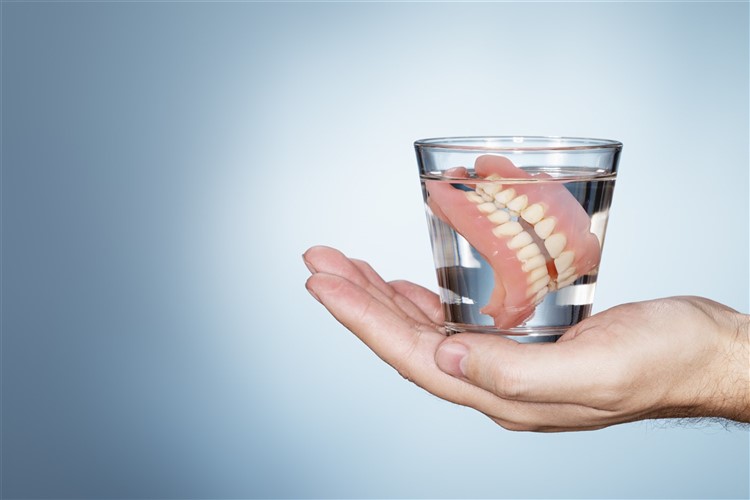
Learn All About Dentures at Parkway
Reasons for Dentures
We typically associate dentures with the elderly, but the fact is that there are lots of reasons that dentures can become necessary at any age. Traumatic accidents which result in a loss of teeth can necessitate dentures, as well as congenital disorders which impact the formation of teeth. Periodontitis (or gum disease) is a leading cause of tooth loss. Periodontitis occurs when plaque bacteria forms along the meeting point of the gums and the teeth and is not cleaned away routinely and begins to calcify around the neck of the teeth. Over time, this bacterium irritates the gum tissue causing inflammation and recession of the tissues and will eventually invade the root system and ligaments of the tooth. Once the support structures of the teeth become impacted, teeth often lose stability or need to be removed to prevent the infection moving into the jaw bone.
Types of Dentures
Removable Partial Dentures – These dentures are for patients who are missing several teeth but have retained a portion of their natural teeth as well. The partial denture clasps onto adjacent teeth using one of several component types and serves to fill gaps with prosthetic teeth. These dentures can be removed for easy cleaning.
Fixed Partial Dentures – These dentures are fixed (attached) to other teeth or abutments from implants and must be removed with the assistance of a dental professional. These dentures are more costly than removable dentures, and they offer more stability.
Complete Dentures – Complete dentures are comprised of a full upper and lower arch and can be made with or without an artificial hard pallet. Full dentures without an upper pallet retain a horseshoe shape.
Copy Dentures– These dentures are replications of previously worn dentures. Copies are made when dentures need to be relined or when dentures have become stained or damaged during long-term wear.
Advantages
Dentures may provide relief from some of the primary implications of not having natural teeth, notably the appearance of the face and jaw profile. Patients who have spent years struggling with unsightly dental decay or discolouration may find relief from the anxiety of social situations and a new sense of confidence. Dentures provide a clean, straight looking smile and retain the structure of the lip and oral cavity.
Patients with dentures may find that their ability to chew food is greatly improved. Ability to articulate and pronounce words may improve quality of life and overall self-esteem.
The insertion of ‘immediate’ dentures refers to the placement of dentures immediately after extraction is complete. This can serve to act as a band aid over the open sockets, protecting the wound and reducing bleeding. Additionally, immediate dentures can help to develop new speech patterns right after extraction and allows chewing to occur sooner than without them. Perhaps the greatest advantage of immediate dentures is that no one will have an opportunity to see you without teeth unless you want them to.
Challenges with Proper Fit
Despite their many advantages, dentures are not without their challenges. One of the biggest challenges with dentures is finding proper fit. Within six months of your natural teeth being removed, your gums and jaw bone will likely have changed in size, shape and density.
Clicking, snapping, and losing suction when eating are all indications of poorly fitting dentures. You may be able to use some dental adhesive to help, but persistent trouble with fit likely requires a professional adjustment of the inner liner for fit and comfort.
Decrease in taste sensation is an unfortunate side effect of a prosthetic hard pallet. This is because while most of the taste buds exist on the tongue, some are also located on the roof of the mouth and even in the throat.
Learning to eat with dentures can be difficult if fit is off. Lower dentures are more difficult to achieve suction with and it is important to chew small amounts at a time, balancing food on either side of the back teeth.
Poor fit can also be the cause of gagging if the prosthetic is sitting too far toward the back of the mouth. Some will need the pallet to be adjusted or removed. For the first 48 hours, high saliva production could worsen a gag response, as the brain learns to interpret the dentures as a non-food item. In cases of persistent gagging, your dentist may recommend changes to the structure of the upper hard pallet as gagging can be psychological and therefore difficult to treat. Going to a horseshoe shaped denture may decrease the likelihood of ongoing gag reflex.
After the first year, if significant changes in the jaw bone and gingival tissue has occurred, dental implants can serve as a support structure for the dentures and prevent additional bone deterioration.
Cleaning
Plaque bacteria exists in the mouth independent of the presence of natural teeth. That means that gingival tissue is still susceptible to irritation if plaque bacteria is not controlled. Dentures should be cleaned gently with the bristles of a soft tooth brush, using a cleaning product suggested by your dentist. Only soak your dentures overnight if your dentist has instructed you to do so. Dentures can be stained, and while some stains can be professionally removed, others cannot. It is important to remove dentures from the mouth when smoking to prevent damage and staining by the heat and tar particles inherent in the smoke.

